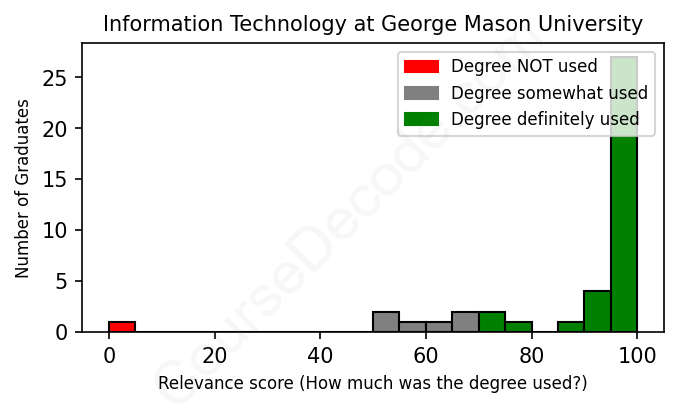
First, some facts. Of the Information Technology graduates from George Mason University we've analyzed , here's how many have used (or NOT used) their degree in their career:

These are estimates based on AI analysis of 42 LinkedIn profiles (see below).
The verdict? Great! Overall, with an average relevance score of 88%, Information Technology graduates from George Mason University have a substantially higher likelihood (+21%) of finding work in this field compared to the average graduate across all fields:
And for comparison, here's the chart for all profiles we've looked at across all degrees.
Also, after graduating, only 2% of these graduates have pursued further education other than another Bachelor's degree (such as a Masters degree or other), compared to the average across all profiles of 35%. This suggests a Bachelors degree is enough for most Information Technology graduates, and it's normal to look for work straight after graduation.
See the details:
|
Relevance score: 100% We think this person has gone into a career highly relevant to their degree. We think this person has gone into a career highly relevant to their degree.
DEGREE INFOGraduated in 2023 from George Mason University with a Bachelor's degree in Information Technology. No other secondary education since. JOB HISTORY SINCE GRADUATIONIT Support Technician Project HOPE Sep 2023 - Mar 2024 ABOUTNo information provided. |
The top 10 most common jobs done by the graduates we've analyzed (ranked most common to least) are:
After looking through the job titles of graduates from George Mason University with a degree in Information Technology, one clear trend emerges: the majority of these roles fall within the tech field and are closely related to their degree. A significant number of graduates have landed positions as Cyber Security Engineers, IT Specialists, or Software Engineers, all of which directly utilize the knowledge and skills they gained during their studies. Cyber security roles, in particular, seem to dominate, highlighting the growing importance of digital protection in today’s tech-centric world. Other common roles include Network Administrators and IT Support Specialists, which also leverage skills tied to problem-solving and technical support.
However, not every job listed is directly relevant to an Information Technology degree. Some positions, like Help Desk roles or Project Management, while they might involve some technical skills, are often more focused on user support, administrative tasks, or project coordination rather than core IT competencies. It's a mixed bag, really. While many jobs are indeed relevant and provide a solid career path for IT graduates, others might not fully align with the specialized education they received. If you’re considering a career in IT, it’s good to know that there are plenty of paths available, but it's also important to aim for roles that truly resonate with your degree’s focus to ensure you get to flex those tech skills you'll be learning in school!
Here is a visual representation of the most common words in job titles for Information Technology graduates (this is across all Information Technology graduates we've analyzed, not just those who went to George Mason University):

Graduates from George Mason University's Information Technology program seem to have pretty solid career trajectories, especially when it comes to their first jobs post-graduation. Many of them kick-start their careers in roles like help desk technicians or IT support specialists. This isn’t surprising, as these entry-level roles are great starting points for gaining hands-on experience and understanding the ins and outs of IT. Over the years, a lot of these graduates then move into more specialized positions, often revolving around areas like network administration, cybersecurity, and systems engineering. This upward mobility indicates they are building on their foundational skills and aligning their careers more closely with the diverse and ever-evolving world of IT.
Five to ten years after graduation, many alumni have advanced into higher-level roles such as software engineers, cybersecurity analysts, or IT managers, showcasing that their degrees are leading to rewarding careers. It's worth noting that graduates who've entered the field more recently are also quickly rising through the ranks, especially in tech giants like Amazon Web Services and consulting firms like Accenture. While there may be some degree of variance in specific career paths, the overall trend suggests that a degree in Information Technology from George Mason University generally provides a strong foothold for a successful and relevant career in the tech sector. So, whether you start off as a tech support specialist or dive into software development, there's a clear path to build a successful future in IT right from GMU!
Honestly, a Bachelor’s degree in Information Technology can be pretty challenging, but it really depends on your interests and background. At George Mason University, you’ll likely find a mix of tough coding classes, systems analysis, and hands-on projects that can be demanding at times. It’s not impossible, though! If you enjoy technology and are willing to put in the effort, you might find it manageable and even fun. Overall, I'd say it might be a bit harder than some other degrees, especially if math and logical problem-solving aren't your strong suits, but with determination and good study habits, you can totally handle it!
Most commonly, in the LinkedIn profiles we've looked at, it takes people 4 years to finish a Bachelor degree in Information Technology.
Looking at the job histories of IT grads from George Mason University, it seems like a mix of good opportunities and some that probably didn’t pay as well. For folks who graduated back in 2010 to 2013, many made solid moves into roles like Cyber Security Engineer and Network Development Engineer at reputable companies like IBM and AWS, which typically come with decent salaries. But for some recent grads, like those from 2022 and 2023, their jobs appear to be starting out a bit more modestly, like IT Support or Technician roles. So overall, while older grads seem to be doing pretty well, it might take the younger ones a bit more time to climb the salary ladder, especially in a competitive industry like tech!
Here is a visual representation of the most common words seen in the "about" section of LinkedIn profiles who have a Bachelor degree in Information Technology (this is across all Information Technology graduates we've analyzed, not just those who went to George Mason University). This may or may not be useful:

Here are all colleges offering a Bachelor degree in Information Technology (ordered by the average relevance score of their Information Technology graduates, best to worst) where we have analyzed at least 10 of their graduates: